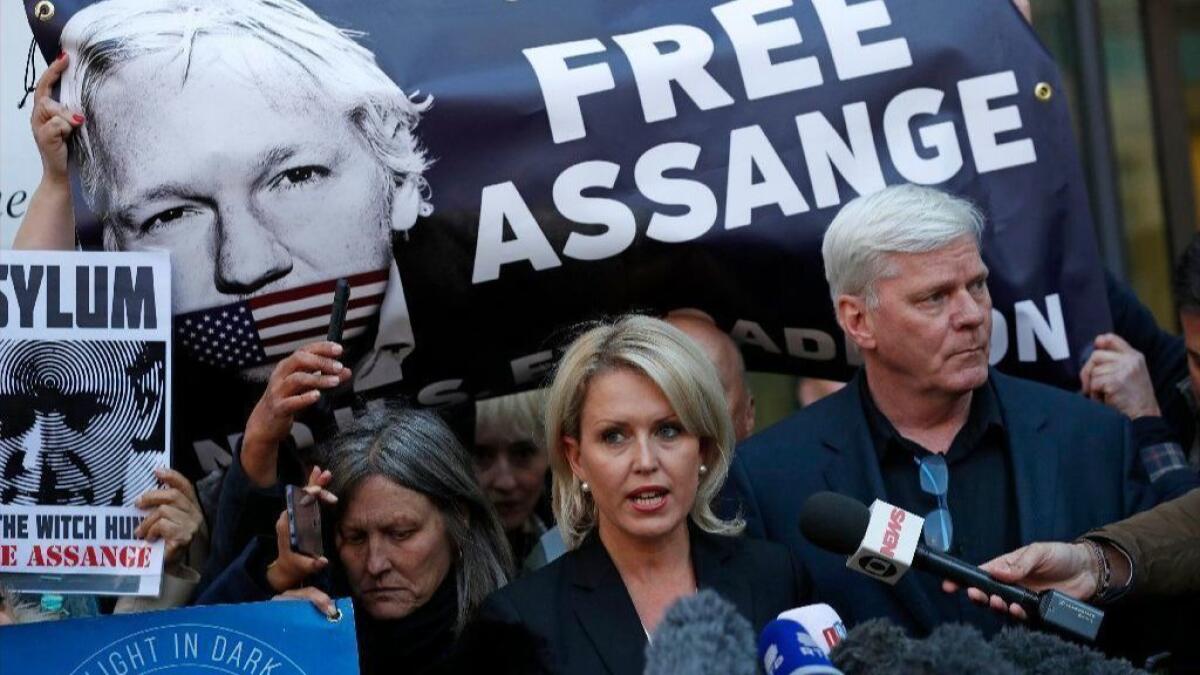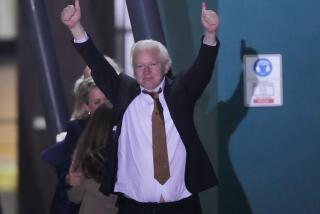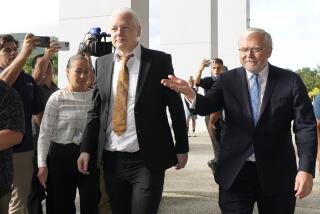Who is Julian Assange? Arrest of WikiLeaks founder spotlights a showy yet enigmatic figure

- Share via
Reporting from Washington — With his shock of Warhol-white hair, black leather jacket and self-proclaimed mission to lay bare official malfeasance, Australian-born Julian Assange burst onto the world stage more than a decade ago with his creation of the WikiLeaks website.
Assange, arrested Thursday in London after Ecuador revoked his political asylum – and revealed to be under indictment in the U.S. — became a folk hero to some as WikiLeaks unleashed sensitive raw data dumps that irked and embarrassed powerful targets including the U.S. military and diplomatic corps, international corporations and wealthy financiers.
Some of that adulation faded under the cloud of a sexual assault investigation against Assange in Sweden, alleged links to Russian intelligence and reports of abusive behavior toward those in his inner circle.
From inside the Ecuador’s embassy in London, where he sought refuge seven years ago, the 47-year-old Assange worked assiduously to cultivate his hacker-hipster persona, striking a defiant chin-up pose on the balcony of the embassy in the swanky Knightsbridge neighborhood, hobnobbing with celebrity visitors, making high-profile complaints to the United Nations, starting a Twitter account for his cat.
That carefully curated image stood in stark contrast to video of a bushy-bearded, disheveled figure being bundled unceremoniously out of the embassy and into a British police van on Thursday. A short time later, in court on a bail-jumping charge, he appeared to have recovered his equanimity, giving a thumbs-up to supporters in the public gallery.
Before the court convened and the judge issued a swift guilty finding, he sat placidly reading a Gore Vidal novel, according to British media accounts.
Early life
Assange has said little publicly about his early life, but news stories have depicted his childhood in the Australian state of Queensland as nomadic and rootless — a lifestyle he was to emulate decades later, in WikiLeaks’ heyday. A 2017 New Yorker profile described how, before his seclusion in the embassy, he would switch locations every few nights, with seemingly little need for sleep and food.
Assange’s mother and stepfather were reported to have worked in touring theater — a precursor, perhaps, to his love of disguises, like the motorcycle-courier impersonation he employed to slip into the Ecuadorean Embassy in 2012 as he sought to evade extradition to Sweden. Or the theatrical flair often on display as he has jousted, in person or online, with an array of foes.
Born in 1971, Assange’s coming of age coincided, somewhat fatefully, with the dawn of the internet era. He showed an early talent for puzzle-solving and mathematics that swiftly morphed into a knack for computer programming and coding – and for hacking, which led to a brush in his 20s with Australian law enforcement.
WikiLeaks on the map
For Assange, 2010 was a pivotal year. That was when WikiLeaks, started four years earlier, captured world headlines when it unveiled video showing U.S. forces in Iraq fatally shooting at least a dozen Iraqi civilians from a helicopter.
That same year, rape and molestation accusations against Assange from two women triggered an investigation and eventually an international arrest warrant — since dropped — by Swedish authorities. And U.S. financial institutions began blocking payments to WikiLeaks, putting the organization in economic straits.
More blockbuster leaks followed, including the publication of thousands of classified U.S. government documents whose contents, among other things, illuminated abusive treatment of detainees abroad.
WikiLeaks played a significant role in the U.S. presidential election in 2016 with its dump of emails stolen from the Democratic National Committee that were damaging to the campaign of presidential nominee Hillary Clinton. That episode was not part of the hacking-conspiracy indictment against him that was unsealed Thursday, however.
Making enemies
As WikiLeaks’ fame and reach grew, Assange readily acquired allies but was prone to angry fallings-out. He cooperated with filmmaker Laura Poitras in the making of her documentary “Risk,” but was upset by its portrayal of him as narcissistic and manipulative. He railed about what he saw as unfair news coverage, submitting a complaint to a British press-standards inquiry.
Eventually, accounts of his life in the embassy began depicting Assange as something of a houseguest from hell. Britain’s Guardian newspaper wrote that it was “never a very comfortable arrangement at the poky embassy,” with a tiny office also serving as a sleeping space, a shared bathroom and access to a tiny kitchen.
There were personal hygiene issues, according to several accounts. Also, word emerged that he wasn’t cleaning up after the cat.
Ecuador’s former president, Rafael Correa, was sympathetic to Assange’s cause, endorsing his embassy stay. But the arrangement was imperiled after President Lenin Moreno took office in 2017 and began looking for ways to end the stalemate. Toward the end, Assange was said to have been expecting arrest at any moment.
Moreno’s statement on Thursday, announcing the revocation of Assange’s political asylum, seemed almost as aggrieved by the WikiLeaks founder’s household etiquette as his allegedly destabilizing political activities.
“The discourteous and aggressive behavior of Mr. Julian Assange, the hostile and threatening declarations of its allied organization against Ecuador, and especially the transgression of international treaties, have led the situation to a point where the asylum of Mr. Assange is unsustainable and no longer viable,” Moreno wrote.
New confrontation
With an expected fight in British courts over Assange’s extradition to the United States, arguments will probably rage as to whether his work can be considered journalism and protected by the 1st Amendment, or if he is a willing tool of U.S. adversaries such as Russia, engaging in illegal methods and deliberately spreading disinformation.
Assange, in the 2017 New Yorker profile, sounded confident of his ability to confound adversaries, likening his strategy to a chess match.
“If you are good at leading with unpredictability,” he said, “then create a board arrangement that suits your abilities better than your opponent.”
WikiLeaks’ Julian Assange faces U.S. computer-hacking charge after arrest in London »
More to Read
Sign up for Essential California
The most important California stories and recommendations in your inbox every morning.
You may occasionally receive promotional content from the Los Angeles Times.









